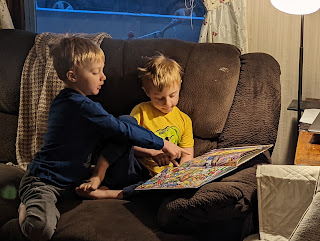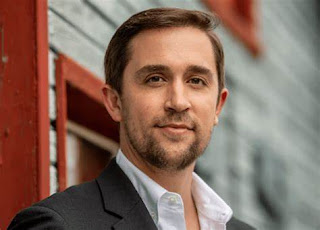This is going to be a long post, but I think it's an important one. We're seeing an escalation in education policy discussion goals, from reform to privatization to, now, the destruction of public education.
Nobody captures this current goal more clearly than
Christopher Rufo, who has rapidly risen from peripatetic thinky tank hired gun to architect of
critical race theory panic as a gateway drug to so many other targets.
Rufo made an appearance at Hillsdale College in April of this year. Bit s and pieces of that speech have been quoted all over the place, but it's important to look at the whole speech to get the big picture. The whole thing (with Q & A) runs about an hour, and I've watched so that you don't have to.
Rufo's strength is building a narrative and precisely and deliberately building the language to sell that narrative. He calls himself a journalist and talks about "breaking stories," and while he appears to have no actual background in journalism, he does build a large, cohesive narrative.
The title of his speech is Laying Siege To The Institutions and it outlines how we got here, what's wrong with where we are, and how conservatives are supposed to fight back. This is going to take some space, so I'm going to try not to interrupt too much as I present Rufo's vision; If you can stick it out, I'll get into that at the end.
How we got here
In Rufo's narrative, 1968 is the "turning point," a time of left-wing militant street activists, people who want to set off bombs in DC and "shoot cops in the head." But the working class didn't rise up; probably, he says, because of the rising standard of living and the growing wealth actually made them anti-revolutionary.
By the mid-70s, the left-wing movement was burned out, down to "a few dozen angry, disillusioned demoralized radicals."
So, declares Rufo, they hatched a new strategy of a "long march" through institutions. They abandoned the proletariat and decided to establish a revolution of "elites and intelligentsia." Rather than capture the means of production (which, in one of his many digs, he notes the academics couldn't handle anyway because college professors don't have the salt-of-the-earth grittiness to work an assembly line), they would instead capture the production of culture and knowledge. The washed up radicals would turn to formalized academia.
Where we are
Rufo has looked at all the institutions, by which he means government, universities, Fortune 100 companies, and K-12 schools. "What I found is something I think is shocking to most Americans."
What did he find? Core concepts from 1968 radicals have been "sanitized, adapted, repackaged and repurposed" and injected into US life at bureaucratic level. So "ridiculous ideas" like white privilege. The real purpose is to break down class to get people to join the Marxist revolution. The language of all these things is "a maze of postmodern language." Language around CRT is meant to obfuscate, "impenetrable and un-opposable." Words like "diversity" and "equity" mean the opposite of what you think they mean. Ideology that is "in its essence, indistinguishable from that we saw in 1968." And it's everywhere.
Every elite institution in the country that has dominance over knowledge, dominance over culture, dominance over even, in many cases, material production, has converged on a unitary ideology.
Rufo says his work is "trying to get to the heart of what these words really mean." (Not, as I might have guessed, trying to redefine these words in ways that further his cause.) There's a key 7-10 concepts, pushing a system of group-based rights, explicitly anti-capitalist. Walmart HR is the same, he says, as a fifth grade education module as diversity training in the Department of the Treasury.
How to fight back (strategy)
Rufo spends a good 7-8 minutes talking about Disney, a corporation that he had recently hammered for daring to oppose Don't Say Gay. So Rufo showed that they were teaching people that the US is "irredeemably racist" (he attributes this language to his opponents several times) and "advocating for all the fashionable causes."
Rufo called them out ("broke the story") for doing racist things like having racially segregated groups, and they "were caught off guard" which he knows because "you could read between the lines" in their press release, because in the "elite milieu" this stuff is not even questioned.
Then he works around to suggesting that Disney is a haven for child sex abusers and reminds us that one of the things these institutions are trying to do is "use the levers of power to fundamentally reshape the narrative around children and sexuality." He talks about tapes revealing that Disney execs openly talk about pushing gay stuff, somehow. And he raises for the first time, but not the last, that these are not well-meaning people who made a mistake.
Rufo advises that the strategy is not "to march back in," in other words, to take the institutions over, but to lay siege to them. From the outside "using our superior public support."
Engage in a narrative and symbolic war, he says. Be aggressive. Define your own terms and set your own frame. At one point he says
You have to be ruthless and brutal in pursuit of something good
And there is a whole lot of world view packed into that sentence.
Next, mobilize public support. Rufo applauds the school board battles marked by the "amazing emergence organically of irate parents" and "organically" is doing a hell of a lot of work there. He creates a whole picture. "These parents come from work, tired, in their dress clothes, showing up at these school board meetings" and "giving hell" to those school board members.
He encourages folks to run for school board. Say you're the anti-crt candidate who wants to return to the basics of reading, writing and rithmetic and "prioritizing excellence over ideology" and you will win (because the phantom ideology that has captured everything is, you see, against excellence).
Third, he says to decentralize control. Centralization is bureaucratic control by a minority of permanently publicly subsidized activists that have turned public institutions into private ideological organizations. If this sounds a lot like what the folks in Rufo's camp actually want to do, you have to remember that for Rufo, "ideology" is a negative term that only ever applies to Those Lefties. On the right, they don't have "ideology"--only "values" and "virtues" and "beliefs." Later, during the Q&A, Rufo will say
The public universities, the DEI departments, the public school bureaucracies are, at the end of the day, patronage systems for left-wing activists.
Here comes the school choice pitch. You should be allowed to rescue your child from this ideological nightmare. And while you may think that an "institution" composed of almost
17,000 separate districts, each with its own locally-selected bosses is the very definition of decentralized, Rufo repeats the old charge that public schools are a monopoly (he's mostly writing his own new symphony, but Rufo is not afraid to play some golden oldies of the movement).
A family that objects to their public school should be free to take their $15K and take it to any public, private, charter, or "this is controversial--I don't know why--but it could also be a religious school." Well, of course Rufo knows why, but part of his shtick is an aw-shucks incredulousness that certain "common sense" stuff somehow isn't widely accepted.
But without choice, "parents will be forced to run their children through a gauntlet that they can't control."
How to fight back (tactics)
First up-- fight at that symbolic and narrative level. Rufo describes this a ripping the gauzy, vague, even deductive veil from the language being used. "What I am doing is providing the words," he says, and that was the basic technique behind his success smearing CRT. "Providing a renewed moral language to be waging the fight' even as they create a new frame. I'd describe this less as "ripping off a veil" and more "slapping your own preferred straw man onto the other side." There's more in this vein, focused specifically on the political efficacy of the tactic.
Next (and this is the part you've probably heard quoted) attack the credibility of the institutions.
Conservatives, Rufo notes, have been reluctant to do this. But he argues that conservatives like what institutions used to be, or what they imagine them to be, but not what they are (at least, not as Rufo depicts them).
Trust in institutions "cratering" creates conditions for fundamental change, says Rufo, unintentionally explaining the motive for attacking institutions this way. And then there's this:
To get universal school choice, you really need to operate from a place of universal public school distrust.
Remember this. It's a useful lens through which to view much of the last several decades of school policy wrangles. Take CRT panic as most recent example--any policy goals that seem part of the whole mess are secondary to that one big message that you cannot trust your public school.
Rufo notes that for people to get active, they have to feel as if they have something at stake. Again, a good insight into his focus on CRT and all the barnacles that have been attached to it--they gave people stakes that unlike, say, pedagogical issues, they could be made to fear. Common Core pointed the way-- it scared lots of people, but the greatest of the fear was that the core would somehow turn your child into a commie lesbian.
Rufo says that public schools, "specifically the public school teachers union" have done that themselves, and then lists all the things that neither schools nor unions nor teachers did, but which folks in his camp have pinned on them with some success-- masks, closed buildings, pushed CRT. And Rufo rarely says things that are silly, he throws in the idea that schools are responsible for "the most catastrophic learning loss likely since World War I."
Final tactic-- create alternatives. We already know that one--creating a parallel system. Well under way.
Wrapping It Up
Rufo encourages his audience not just to think left and right (though definitely do that) but also top and bottom, because remember this is a handful of elites doing all this damage. And he spends lots of time with everyday middle folks and they are great and salt of the earth and to be trusted etc etc etc.
Good can be raised into our institutions, maybe not as they are now, but as they could be.
In other words, burn it all down and build something more to our liking. Some are built for offense, and some for defense, for building institutions that protect the civilizational values and virtues that should be continued from the past into the future." We can choose between the revolution of 1776 or the revolution of 1968; one ends in the unfolding of those founding principles of freedom and equality and the other one ends up in nihilism and despair4, in a bombed out bunker in Greenwich Village in the 1970s.
Bonus Q & A Section
The video includes some question and answer period, which does not feature fresh-scrubbed Hillsdale students, but folks who look more like their parents or grandparents or just donors to the school. It's illuminating.
Q: Someone concerned about social media censorship wants to ask Rufo, whose success has been largely based on his un-censored social media activity, what to do about evil Big Tech.,
CR: Drags in DeSantis who understands that "corporations should be serving the greater good, the country." Political power is ultimately higher than business power. Break up the ideological cartels. Yes, somebody here sounds very much like a Communist, but as always, you have to remember that it's not evil if the ideology you're imposing and enforcing is your own.
Q: This guy despises the term racism because we're all one race, and this is all one nation. Yes, of course, he's an old white guy.
CR: To his credit, Rufo acknowledges that there's a history of racism in this country, but you have to cover it in the context that the country has always progressed toward realizing its high ideals. Also, ordinary folks oppose lessons about CRT, white privilege, systemic racism and want their kids to transcend differences as they rise toward excellence.
Q: This guy is concerned about the erosion of trust. Also, the FBI isn't any better than the Gestapo.
CR: There's a rupture in trust, Rufo says, because "institutions have been untrustworthy. That's the simple fact." Numbers haven't plummeted because institutions are fabulous and "we're just the ungrateful kinds of plebes below." Has nothing to do with any active strategy and tactics aimed at destroying that trust. And here comes one of his few actual applause lines:
The problems aren't going to be solved by asking nicely and politely for the people in positions of power to pretty please do a better job...Appealing to these people will get you nowhere.
You can't let liberals tell you what it's okay to talk about, says the guy who consulted with DeSantis on crafting laws to tell teachers what it's okay to talk about.
You won't get there by being polite, he says, before adding, "Be polite at Hillsdale to your teachers and administration, but out there toughen up."
Q: Blah blah social emotional learning
CR: Academic freedom is a total fraud. Legislatures need to defund these places unless they take orders properly (in Rufo's world, "these professors" make $300K or $400K).
"There's absolutely no reason that teachers need a masters' degree to teach reading to third graders," he says. He references studies that show masters degrees and certification have "zero relationship with quality teaching in the classroom," by which he almost certainly means "test scores on a single Big Standardized Test." But "the craziest people" are in charge of university ed departments, and also, we're spending more money but not getting better results in education (I told you he can play the hits).
He says states should end credentialling entirely (they've started working on it). People can still get ed degrees if they want, but "I think nobody would go. Maybe some lunatics."
Public policy is the greatest tool that we have. Almost all of our problems are created by public policy. Almost all of the worst ideologues in our society are permanently subsidized by public dollars.
But what the public giveth, the public can taketh away.
So we defund what we don't like, fund what we do like.
So what do we make of all this
Still here? God bless you.
The short form of all this is that radicals from 1968 gave up the violent overthrow of the US and--somehow--a couple dozen of them managed to take over every single institution in the country as well as transforming from scruffy radicals into elites. Rather than chase them out, we should trash the institutions they poisoned and start over, with freedom-loving ordinary people.
So, several thoughts.
First, why settle on 1968 for your big year, as if you weren't repeating themes from 1950s McCarthyism or 1930s Red Scares or anarchism freakouts from earlier still. Is your audience conservative Boomers who always hated those long-haired hippy commie weirdos?
There's a lot of internal inconsistency here. Some serves a narrative purpose; those shadowy elite ideologues who took over the country need to be both super-powerful (because we need to be justified in Getting Them and also, that beautiful victim card) and a tiny group (there's more of us Real Americans than them).
Other inconsistencies aren't really inconsistencies, but tells. Your side is ideologues; my side has values. When you use the "levers of power" you are oppressive and evil, but when we get our hands on them, we will use them to enforce our will. That is only inconsistent if you think some sort of principle should be involved here, but the only principle involved is "People like me should be empowered to enforce our will on others, because our will is righteous true and serves us." Break corporations and make them support your view. Fund only the institutions that say what you agree with. The answer to the oft asked question, "Why is that wrong when I do it but right when you do it" will always be "Because we are right and you are wrong."
Or, as Frank Wilhoit puts it:
Conservatism consists of exactly one proposition, to wit: There must be in-groups whom the law protects but does not bind, alongside out-groups whom the law binds but does not protect.
Rufo doesn't represent any sort of conservatism I recognize, but that's the mask they're wearing these days.
The other thing striking about Rufo is how overtly and deliberately political he is (Politics is "the business of getting power and privilege without possessing merit" --P. J. O'Rourke). All of this is about using words and forming phrases to leverage and accumulate power, taking positions and maneuvering around your opponent. The people on the other side are not actual human beings; they have no good intentions, no legitimate concerns. In fact, none of this has to do with people with actual honest concerns or differences. Rufo doesn't invoke ordinary people with some sense of who they are and what they want and need, but because invoking them gives an argument some extra weight and helps build a winning frame.
Certainly there's no thought about a institution-free society. Rufo talks as if we just cut all the supports and let everyone be free, as if that wouldn't result in a society in which people were only as free as their bank accounts allowed them to be. Rufo and his crowd would be plenty free.
There's certainly no concern about the larger effects of these tactics. What happens, for instance, in a society where trust has been systematically crushed and undermined? Nothing good, I'm betting, but Rufo's perfectly happy to go there, and increasingly others are willing to go there with him
(here's Laura Ingraham calling for an end to public education).
I've sparred and chatted with plenty of folks on the other sides of these issues over the years. Over the last decade they have become even less likely to demonize opponents, more likely to see nuance and issues on all sides, even when they disagree. They have been mostly conservatives, with a conservative's natural tendency to want to preserve things. Maybe I've been naive to think that some of them were never going to go this far, even as I've understood that much of them have been pointing in this direction, and many of the folks financing the movement wanted exactly this. But I wonder what they think privately of this new slash and burn addition to the crew.
Rufo represents an extreme version of ideas that have long been around, like the idea that public education is just a scam so that the teachers union can get teachers jobs thereby resulting in dues that fill the coffers of the unions which are just fronts for the Democratic party. Or the idea that if government went away (and stopped making me pay taxes to support Those People) then we would all live in a happy paradise of freedom. Or that a bunch of stuff (under the umbrella of anything from evolution to segregation to CRT) is being taught to undermine my view of the world and make my kids think stuff I disagree with.
Like his buddy DeSantis, Rufo is not so much about conservatism as he is about authoritarianism, about christianist-fueled control or replacement of all institutions (and do notice--Rufo does not distinguish between public institutions and private corporations--he wants to run them all). This is aggressive, smart authoritarianism that only really has one question to ask before it either lifts you up or smashed you-- are you on their side? Trumpsim was just some throat-clearing for these folks; soon I'm afraid they'll be in full voice.




